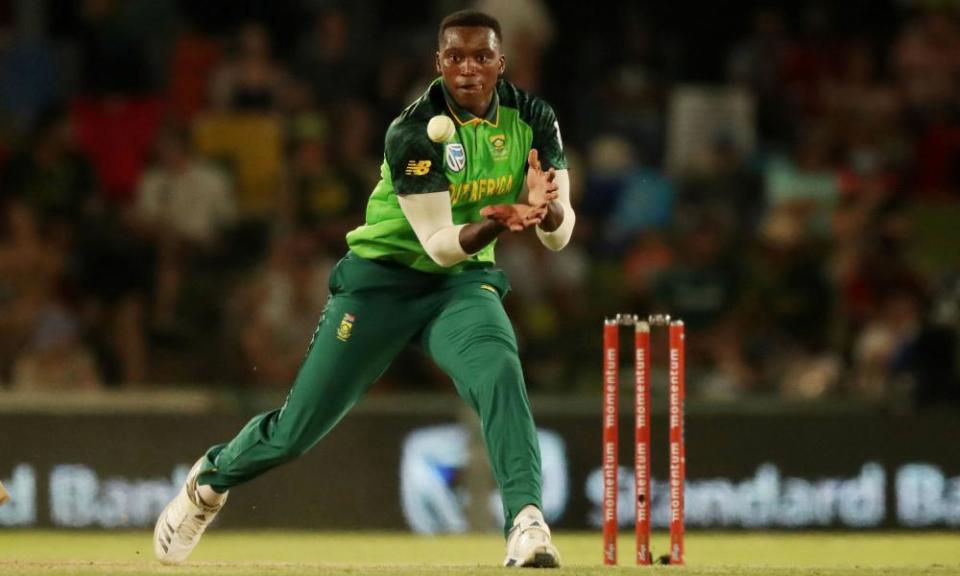Cricket's dressing rooms have questions to answer over black players' isolation

Back in July the South African fast bowler Lungi Ngidi answered a question about the Black Lives Matter movement: “It’s something we will be addressing as a team,” he said, “and if we are not, it’s something I will bring up.” It was a tiny spark, but it started a fire that has burned through the South African winter, as more and more black players have started to open up about their unhappy experiences playing for the national team. In the end, Cricket South Africa launched a Social Justice and Nation Building project, to investigate whether it ought to pay reparations to players who were discriminated against.
Makhaya Ntini was one of the men who spoke out. He talked about how isolated he felt during his long international career. “I was forever lonely,” he said. Ntini used to run to and from the ground because he felt so uncomfortable on the team bus. Graeme Smith was captain then, and is the director of cricket now. He has defended himself strongly against any accusation that he discriminated against players. He has also said he was surprised to learn at last how unhappy Ntini was, and has spoken frankly about the mistakes he made in his personal relationships with several players, of all races.
Related: 'Others did less but got more': England's lost generation of black cricketers
“It was impossible for me to win everyone’s approval at the same time,” Smith said, “but that is the nature of professional sport.”
A lot of this is unique to South Africa, but not all of it. There are echoes here of the conversation that’s going on about black experiences in English cricket, especially in what Ntini and Ashwell Prince said about the challenges of being in the minority in a changing room. “These are stories that have made people squirm,” the South African journalist Firdose Moonda wrote, “and told them of the experience of being othered.”
It was impossible to read that line without thinking of the recent interviews with two black English cricketers, Mark Nelson and James Pearson, published last month in the Observer. When Nelson spoke about how his teammates would address him in a kind of phony London slang, he was talking about feeling othered. Same with Pearson, when he spoke about how his teammates would greet him “yo, yo, yo” as he walked into the dressing room.
Neither Nelson or Pearson felt the behaviour was racist, neither argued that the people who said it were being malicious. But both spoke about how it made them feel uncomfortable, how, over time, that discomfort made them feel isolated and that isolation had a negative effect on their performance.
“I wish I had told people, ‘Look, you might think that’s funny, but it’s not funny,” Nelson said. “I don’t like it, it makes me feel this big.’”
These are hard conversations to have, awkward, complicated, and uncomfortable. Maybe that’s why we have put them off so long. Interestingly, Pearson was playing under a black captain at the time, Mark Alleyne, who picked up on what Pearson was going through back when it happened, and even spoke about it in an interview in 2004. “James Pearson is a good cricketer, England Under-19,” Alleyne said then. “He’s struggling. He comes in, puts the CD on and he’s just waiting for someone to say, ‘that’s rubbish’. And he loves Lara and West Indies. The more he goes on about them, the more he’s going to be isolated.”
Alleyne says now: “You’re always much wiser after the event. It’s really sad he had a bad experience, because he was a promising young cricketer, and at that time we needed young prolific top order batters, we were desperate for him to come through.”
Alleyne has been in the game a long time, and has a good understanding of the complicated business of dressing-room dynamics. His Gloucestershire team won five one-day titles in two years. “We did spend a lot of time trying to shape the changing room culture. When you get it right it can quite a powerful thing, but you’d be naive to think you were getting it spot on every time.”
Related: New chairman Watmore admits lack of ECB board diversity is unacceptable
At Gloucestershire, Alleyne says, “the previous culture was a classic dressing room ‘banter’ culture”. It wasn’t the black players, but there were people who were picked on, singled out to be the butt of the joke, and suffered because of it. When he took over as captain “we tried really hard to create a culture that would help people to play at their best”. But it didn’t work for everyone. It never does. The blunt reality of professional sport is that “changing rooms are pretty tough places, and every single player will have a story about where they felt undervalued, that’s the nature of trying to fit a 22-man squad into an 11-man team”.
There are a lot of reasons why a player might feel he doesn’t fit in. “Forget about black and white for a second,” Alleyne says, “look at young and old. When I came in, it was all about senior players telling you what to do.” Class and schooling have a lot to do with it too, and both intersect with race. Alleyne feels the game has started to change, that “the players are better educated on how to behave in those environments” and the teams have started to learn the benefits of having a more inclusive culture.
The challenge, Alleyne says, is to create a dressing-room environment “where people can speak candidly, rather harbouring and hoarding thoughts because they feel like it’s not a space where they can speak out”. It’s one the game has failed to meet in the past, in England, and South Africa.

 Yahoo Sport
Yahoo Sport 





































